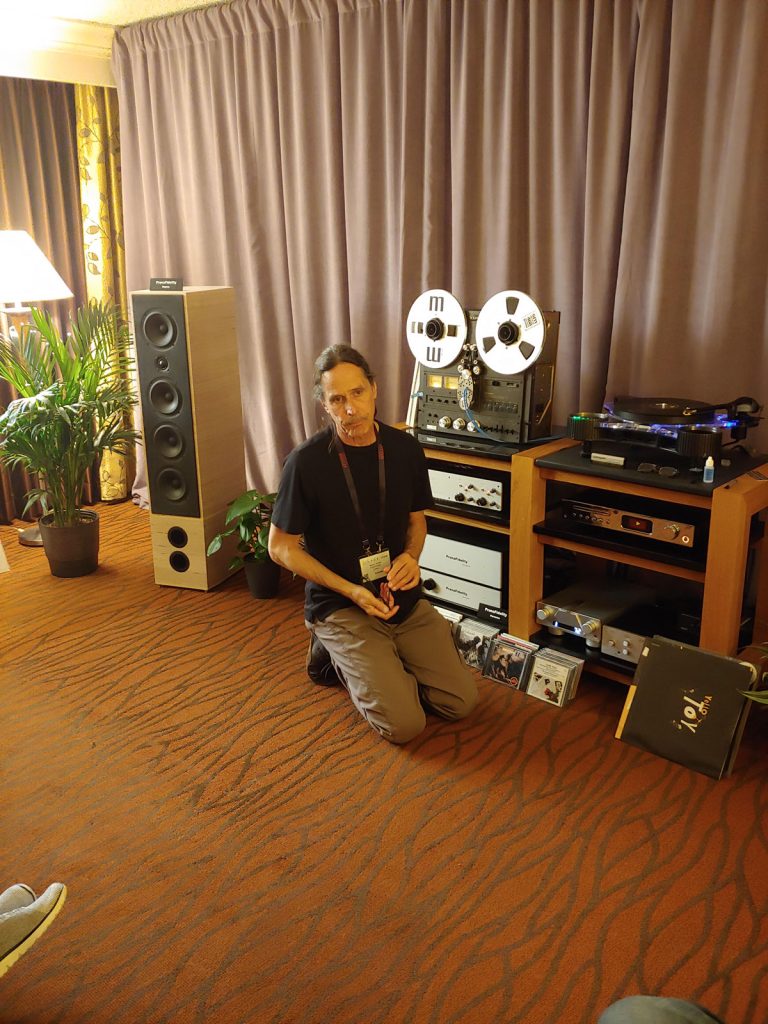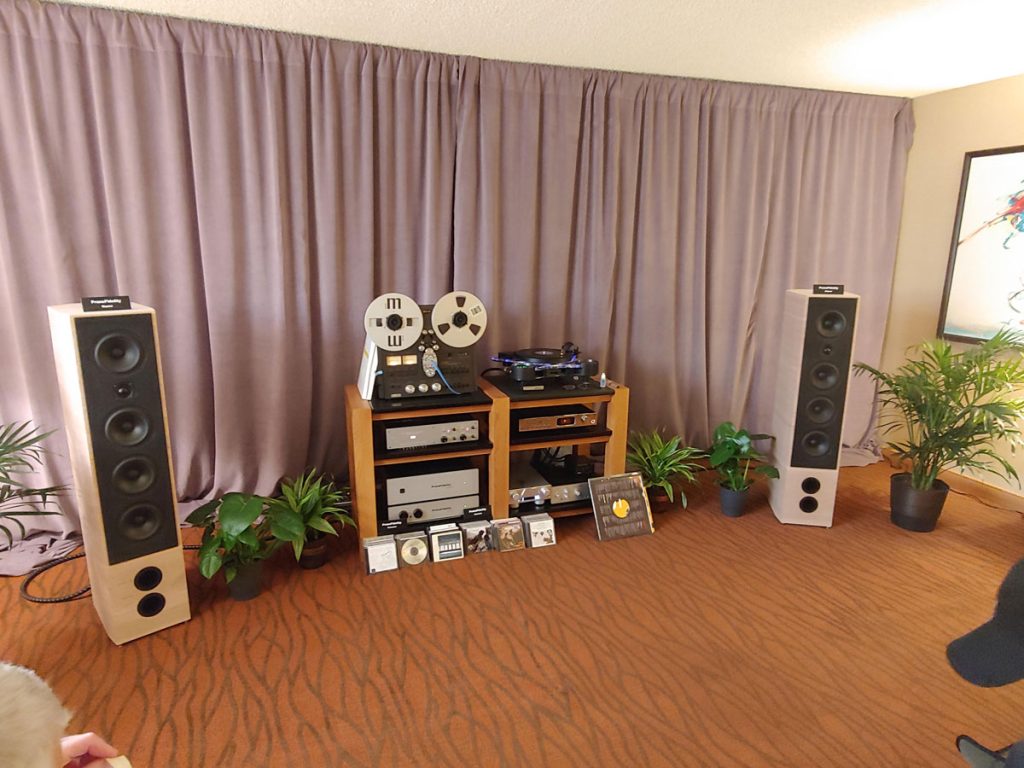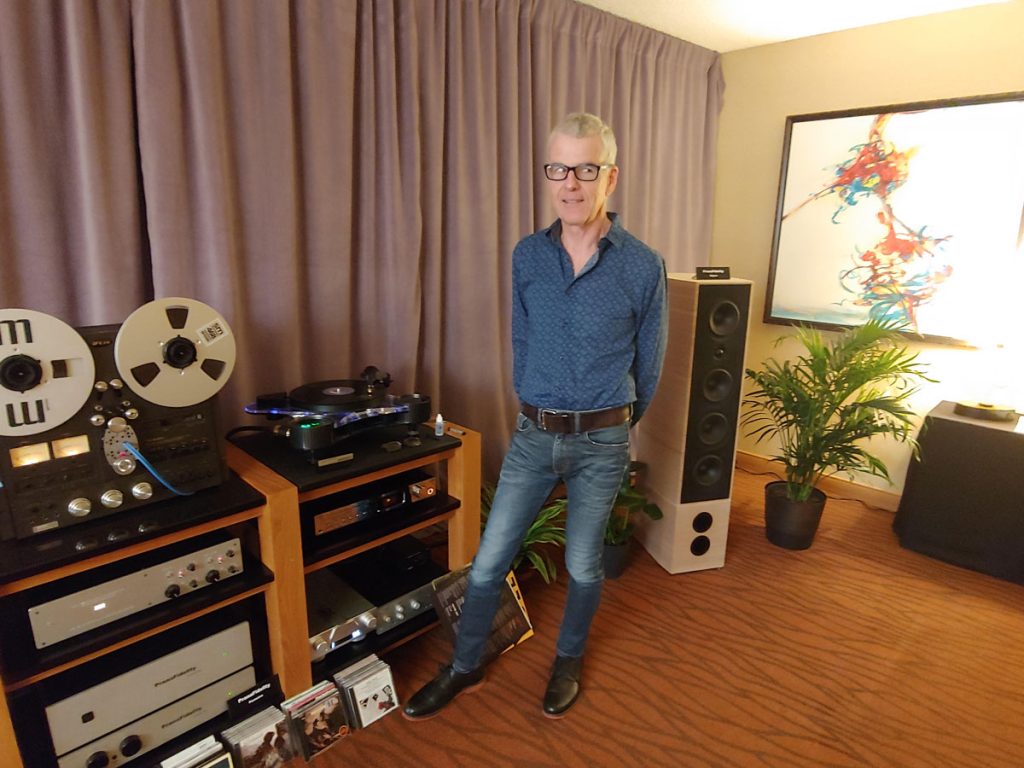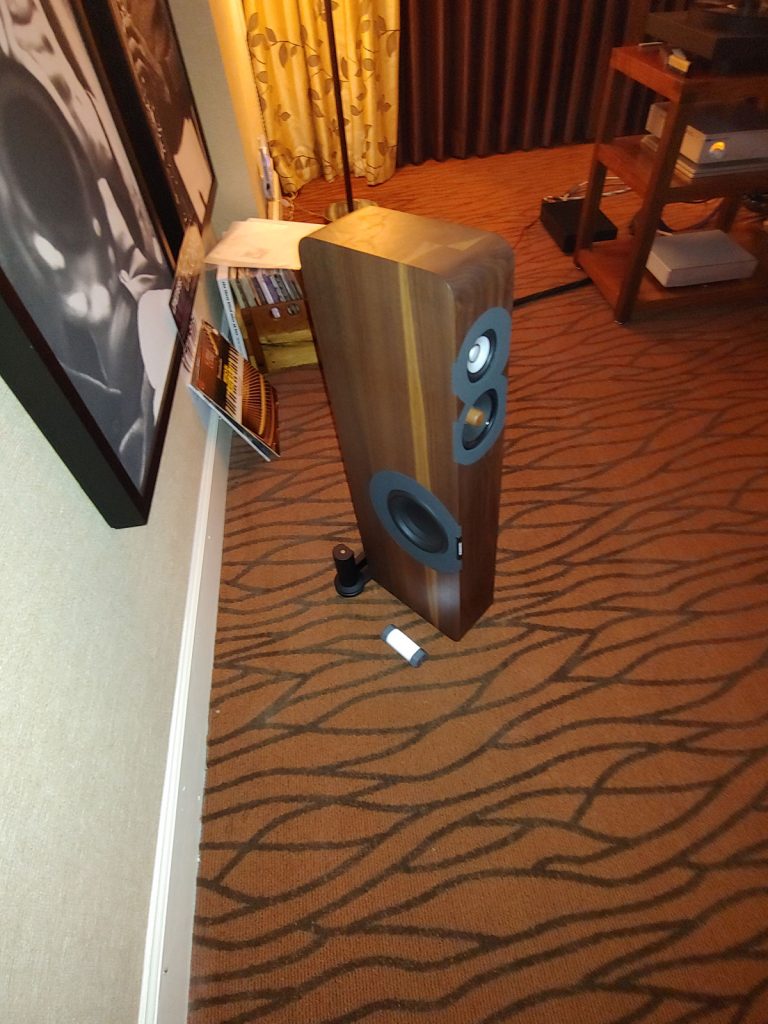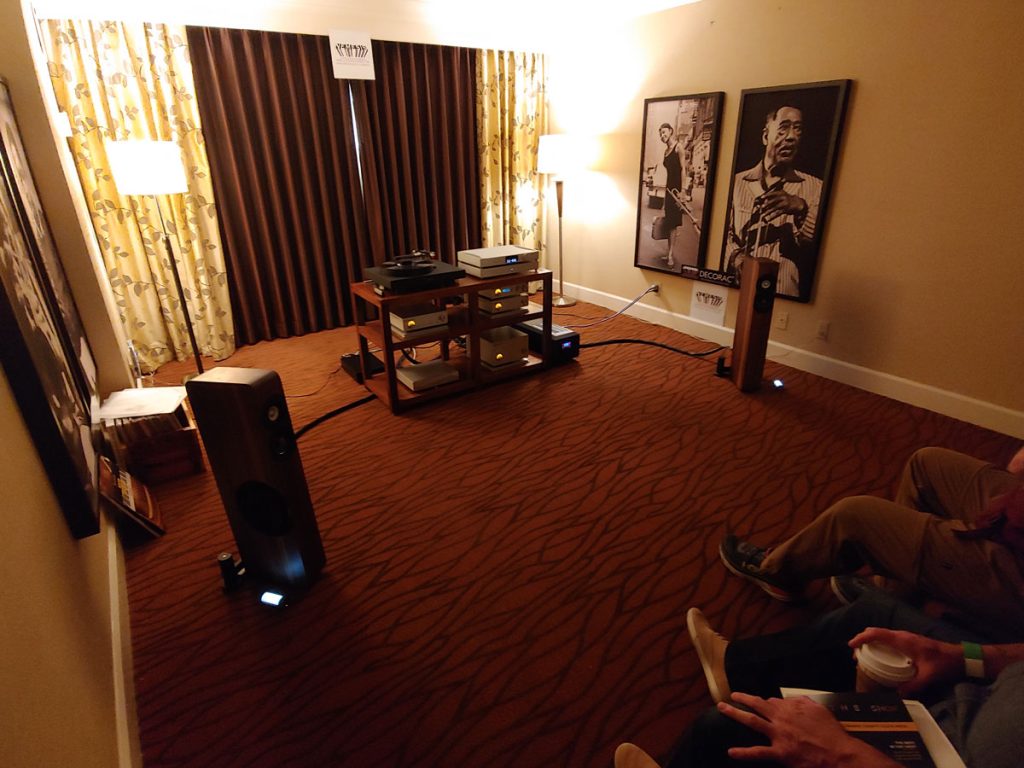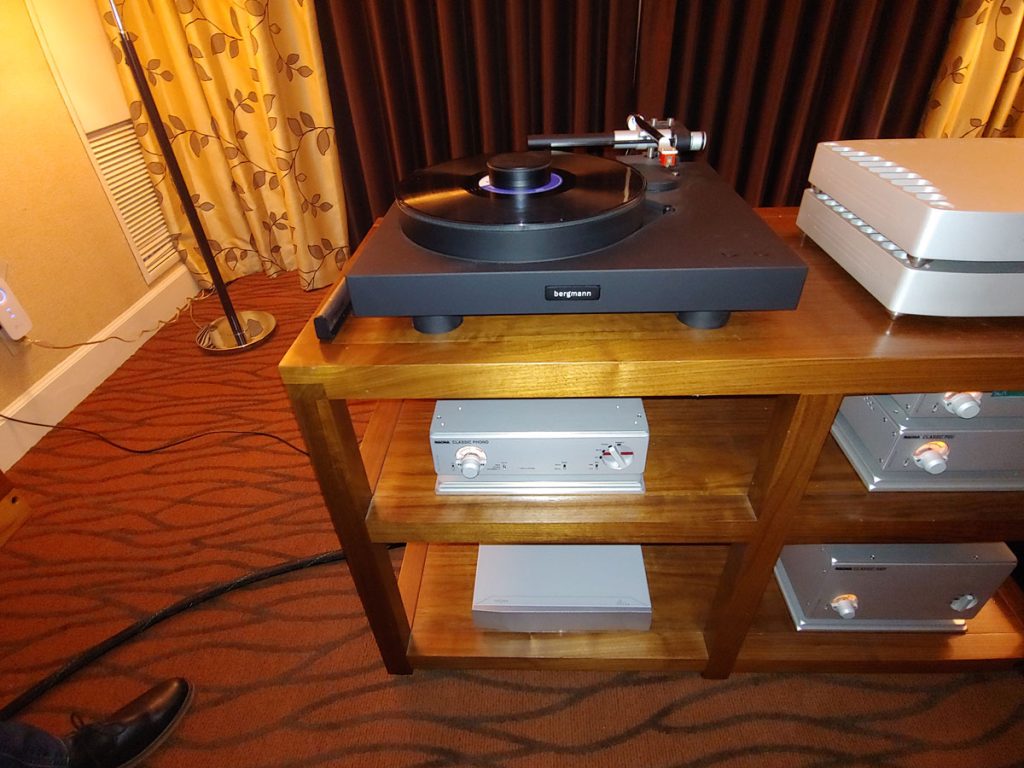“It’s been many years since I heard an audio system that I could happily make my own for the rest of my life. This is one of those systems.”
Mr. Record Visits THE Show 2023
I love audio shows, but I didn’t always love them, so before I talk about this particular show I’d like to share a little bit of my personal history with audio shows.
Back in the early 80s I had a friend named Victor Fonseca, and like most men named Victor, he went by the name Vic. Vic left us far too early, due to a botched surgery in 2000. I still miss him a lot. He was my very first audiophile friend, and when I reminisce about our time as friends, I also wonder if he’d admire my current system. Vic was a young man with a resale number, and a strong desire to flip audio gear just so he could hear it. Flipping was a new concept to me, and knowing Vic gave me the opportunity to hear tons of audio gear that most people only read about. I teased Vic about his show-going habits, and I told him with arrogant pride that I would never attend an audio show unless somebody was paying me to do it. The truth is, I was socially immature, and I was lying to him and to myself. Fate is a funny thing, and it caught up with me. Between 1999 and 2007 I was paid, by my employer, Cisco Music, to attend the annual CES in Las Vegas, and numerous other shows in Los Angeles, New York, Chicago, and Montreal.
A funny thing happened during my time at Cisco Music. I got hooked on audio shows. Back then the shows were different. The most clearly visible difference was turntables, because just about every room had one, and if a digital recording was heard, it came from a compact disc. Nobody called CDs “Red Book,” and if somebody wanted to hear a female vocal it didn’t mean a third rate singer drenched in digital reverb. It meant a jazz legend, like Sarah Vaughan or Ella Fitzgerald.
Needless to say, I’m nostalgic and I long for the good old days. But wait, the good old days were actually happening at this year’s THE Show in Costa Mesa, California, albeit in room 222. Meeting Karen Valentine would have been cool, but hearing an audio system provided by my close friend Dan Meinwald, the owner of EAR USA, and that very cool dude, Steven Norber, the owner of Prana Fidelity, is even cooler. There was a time when Dan and Steven displayed their wares in their own separate rooms. I don’t know when they became friends, or remember which show it was that I found them in a room together, but the result of their combined efforts has left its mark on me. Go ahead and call me old fashioned, but my music sources are still my turntable and my CD player, and those are the formats I heard in their room. Dan provided the system’s front end, which consisted of the Helius Designs Viridia turntable ($7195) and the Helius Omega tonearm ($3695). Attached to the end of the Helius arm, of course by screws, was an Audio Technica OC9SXH ($695) moving coil cartridge. They also brought a CD player, the latest version of the EAR Acute, or at least I think so, since somebody forgot to show it on the system list. Oops. Ask me if I care. I love the fact that the machine still had buttons on the front panel and it sounded awesome. There was even a retro piece included in the analog front end, and it was an 80s era Audio Technica-Signet MC transformer, which impressed me, because it performed the ever-important cartridge loading perfectly. I know the AT OC9 very well, and getting the top end to sound correct can sometimes be challenging. The top end was correct. The cartridge’s amplification was provided by an EAR 324 solid-state phono stage ($6095). Also on hand was a Tim de Paravacini modified Technics RS 1500 reel-to-reel tape deck. Dan also provided the Townsend Allegri Reference MK2 linestage preamp ($14,000). Steven provided the power amplifier and the speakers, and they were the Prana Fidelity purna/ma amplifier ($10,500) and the Dyhana speakers ($19,500). Each of these components deserves a review and I’d love to be able to play with Steven’s insanely fine sounding speakers. It’s been many years since I heard an audio system, in a freaking hotel room, that I could happily make my own for the rest of my life. This is one of those systems.
Earlier in the morning, my friend Mitch and I tuned-up our ears at his house. We played some of our favorite demo CDs, and we took three of them to the show. One of them was Shelly Manne/Andre Previn album, Bells Are Ringing. Cut 8 is “Muchacha,” and it’s one of my favorite cuts. I’ve heard this cut countless times on countless systems, at countless audio shows. “Muchacha” is a challenging percussion demo that some systems fail to play right. It has provided me with many you-have-to-be-kidding experiences. So many, in fact, I expected another, but it didn’t happen. Holy dynamic range and correct tonality, Batman, this system delivered the unvarnished goods! When I first walked into the room I was greeted by the unmistakable sound of T-Bone Walker’s electric guitar. I know mono era guitarists very well, and they are a big part of my LP collection. Hearing Walker’s guitar sounding dead-nuts perfect is for me just about all an audio system needs to do.
The Dhyana speakers left me in a state of awe. They have an organic way of reproducing recorded music that isn’t necessarily unique among the very best speakers, but many high end speakers don’t do what these speakers did with incredible ease. I was raised on my dad’s Altec Coronas, so speakers that make light of dynamics, which is what every single electrostatic speaker I’ve ever heard does, bugs the hell out of me. These speakers are dynamically linear and tonally perfect. I love the effortlessness of Magnaplaners, but in every Maggie demo I’ve ever heard, they only seem to achieve what they do so very well on a limited number of recordings. If you value front to back depth over most aspects of reproduction, and you only listen to small ensemble music, or you don’t enjoy rock and roll, then maybe there are better speaker choices for you. I frankly can’t imagine that there’s any kind of music these speakers wouldn’t be great on, and since tonality, dynamics, and plain old believability are my priorities, I’m completely sold on these speakers.
I’d love to say that I heard other systems that impressed me as much as Dan and Steven’s, but what I actually heard were other components that I would have liked to hear in better sounding rooms. Hotel rooms were never intended to be HiFi rooms. Sometimes you get a good one, and sometimes you get one that ruins your best intentions. Alma Music is a high end store in San Diego, California, and its owner is a really nice man whose name is Fabio Storelli. Fabio’s room had bass issues, but if you stood against the side walls, which is far from where you’d want to sit or stand, the bass was fine.
Despite this problem, his Nagra electronics showed great promise, but what I was most impressed with was the Boenicke W8 SE speakers ($16,500). As I’m not normally a fan of small speakers, the fact that I kept on thinking “these speakers are good”, means they are excellent speakers. They are a floor-standing mini-monitor that throws an image that’s slightly larger than you would expect, but that was in a bad room. I really do need to hear them again. The drivers look seriously righteous, and the sound of these speakers has a wonderful sense of rightness. I was also impressed by Fabio’s turntable, the Bergmann Modi ($17,000). I was very pleased to hear flawless tracking on a very hard to track LP, the famous RCA direct disc, from Japan, of Beethoven’s Appsaionata. Pianist Ikuyu Kamiya’s performance is one of the best ever committed to LP, and I expected to hear breakup on the peaks, but it never happened. I’m sure Hana Umami Red ($3950) is an excellent tracker but Fabio said, “It’s the table,” and I’m sure he’s right. I’ve never owned a working SLT arm, but I know of their benefit on pianos. I used to be the US sales rep for the Three Blind Mice jazz records, so I know more than the average audio dude about hard-to-track pianos.
I was a fish out of water in the TAD room. I have zero use for Roon, Tidal, or anything similar. My computer lives in my office, where I frankly feel computers belong. However, I’ve also been a fan of TAD speakers for many years, as I used to work for Westlake Audio in Newbury Park, California. Westlake is famous for building some of the finest studio monitors in the world, and many of their monitors have been repurposed for home use. TAD woofers, compression drivers, and tweeters are used in Westlake’s larger speakers. The design and build quality of TAD’s drivers is second to none, and those words also apply to their audiophile speakers. I became an admirer of the Compact Reference Ones when I heard them driven by Zesto tube electronics, in the home of George and Carolyn Counnas. The best part of visiting the TAD room was hearing Howard Rumsey’s Lighthouse All Stars. I know the distinctive sound of Bud Shank’s flute and Bud’s tone sounded pure, beautiful, and correct.
My wrapup is this: Spending an entire day with my best friends Mitch and Steve reminds me that I am blessed to have such great friends. Hearing a system like the one in Room 222 reminds me how much I still love this great hobby. I was also reminded that great music and good old fashioned fun can still be experienced at a high end audio show. A few more turntables, and a lot less streaming could make the next year’s show even better
Review Written By: Robert Pincus on Positive-Feedback.com
